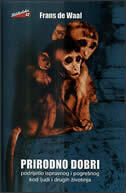
Prirodno dobri: podrijetlo ispravnog i pogrešnog kod ljudi i drugih životinja
まだ評価がありません
Thriller & Suspense
Action & Adventure
形式
ハードカバー
ページ数
429
言語
クロアチア語
公開されました
Jan 1, 2001
出版社
Naklada Jesenski i Turk, Zagreb
ISBN-10
9532220186
説明
Frans de Waal, a noted ethologist and primatologist, invites readers to explore the intricate origins of morality among humans and other animals. His insightful examination challenges conventional notions of what defines right and wrong, proposing that moral behavior may not be as uniquely human as often assumed. Through a captivating blend of scientific research and philosophical inquiry, the narrative reveals the evolutionary roots of ethical conduct.
De Waal's expertise shines as he delves into the social behaviors of various species, drawing parallels that illuminate the shared values present in both humans and animals. By observing the dynamics within primate groups and beyond, he presents compelling evidence that empathy, cooperation, and fairness exist in the animal kingdom, prompting a re-evaluation of human moral superiority.
With contributions from Ljerka Pustišek, the book enriches the discussion of morality's biological underpinnings. Together, they offer a profound perspective that encourages readers to recognize the continuity of moral instincts across different species and reflect on the implications for human societies and relationships.
De Waal's expertise shines as he delves into the social behaviors of various species, drawing parallels that illuminate the shared values present in both humans and animals. By observing the dynamics within primate groups and beyond, he presents compelling evidence that empathy, cooperation, and fairness exist in the animal kingdom, prompting a re-evaluation of human moral superiority.
With contributions from Ljerka Pustišek, the book enriches the discussion of morality's biological underpinnings. Together, they offer a profound perspective that encourages readers to recognize the continuity of moral instincts across different species and reflect on the implications for human societies and relationships.